Macrophage-derived nanovesicles exert intrinsic anti-inflammatory properties and prolong survival in sepsis through a direct interaction with macrophages†
Abstract
Despite numerous advances in medical treatment, sepsis remains one of the leading causes of death worldwide. Sepsis is characterized by the involvement of all organs and tissues as a consequence of blood poisoning, resulting in organ failure and eventually death. Effective treatment remains an unmet need and novel approaches are urgently needed. The growing evidence of clinical and biological heterogeneity of sepsis suggests precision medicine as a possible key for achieving therapeutic breakthroughs. In this scenario, biomimetic nanomedicine represents a promising avenue for the treatment of inflammatory diseases, including sepsis. We investigated the role of macrophage-derived biomimetic nanoparticles, namely leukosomes, in a lipopolysaccharide-induced murine model of sepsis. We observed that treatment with leukosomes was associated with significantly prolonged survival. In vitro studies elucidated the potential mechanism of action of these biomimetic vesicles. The direct treatment of endothelial cells (ECs) with leukosomes did not alter the gene expression profile of EC-associated cell adhesion molecules. In contrast, the interaction of leukosomes with macrophages induced a decrease of pro-inflammatory genes (IL-6, IL-1b, and TNF-α), an increase of anti-inflammatory ones (IL-10 and TGF-β), and indirectly an anti-inflammatory response on ECs. Taken together, these results showed the ability of leukosomes to regulate the inflammatory response in target cells, acting as a bioactive nanotherapeutic.



 Please wait while we load your content...
Please wait while we load your content...